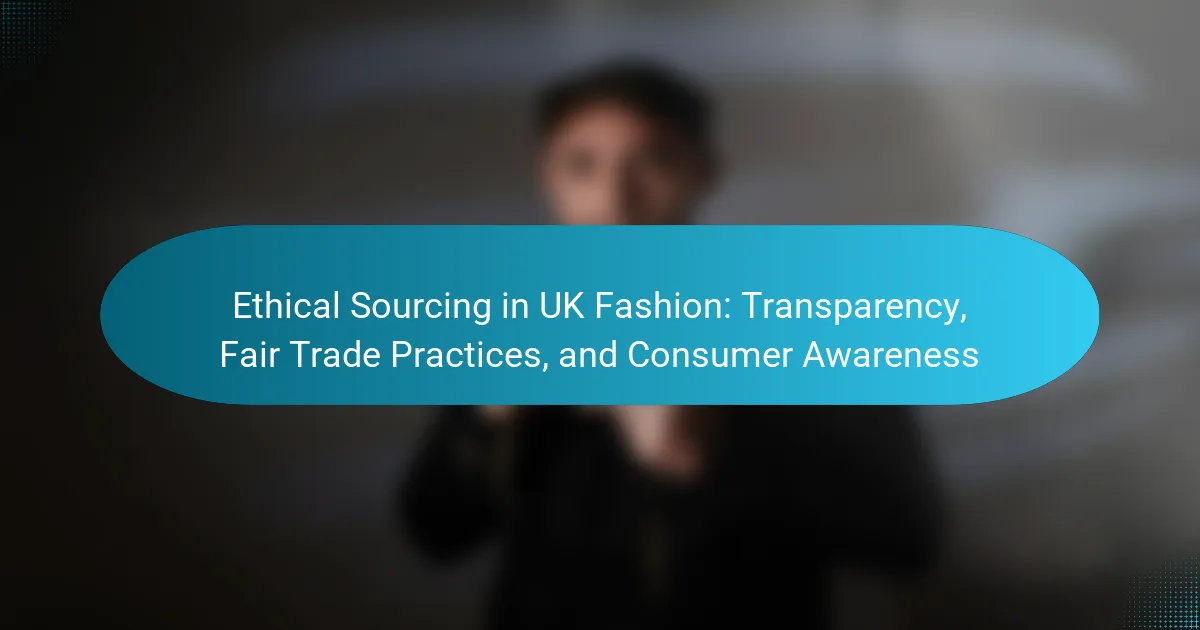
What is Ethical Sourcing in UK Fashion?
Ethical sourcing in UK fashion refers to the practice of obtaining materials and products in a responsible manner. This includes ensuring fair labor practices, environmentally sustainable methods, and transparency in the supply chain. Brands engaging in ethical sourcing prioritize the welfare of workers and the environment over profit. They often collaborate with suppliers who adhere to fair trade standards. According to the Ethical Trade Initiative, ethical sourcing helps combat exploitation in the fashion industry. This approach promotes consumer awareness about the origins of their clothing. It encourages informed purchasing decisions that support ethical practices.
How does Ethical Sourcing impact the fashion industry?
Ethical sourcing significantly impacts the fashion industry by promoting sustainable practices and fair labor conditions. It encourages brands to prioritize transparency in their supply chains. This shift leads to increased consumer awareness and demand for ethically produced goods. According to a 2021 report by McKinsey & Company, 67% of consumers consider sustainability when making a purchase. Ethical sourcing also reduces environmental harm by advocating for eco-friendly materials. Additionally, it fosters better working conditions for garment workers, which can enhance brand loyalty. Companies adopting ethical sourcing often see improved public perception and market competitiveness.
What are the key principles of Ethical Sourcing?
The key principles of ethical sourcing include transparency, fair labor practices, sustainability, and responsible sourcing. Transparency ensures that supply chains are open and traceable. Fair labor practices involve providing safe working conditions and fair wages to workers. Sustainability focuses on minimizing environmental impact through eco-friendly materials and processes. Responsible sourcing emphasizes selecting suppliers who adhere to ethical standards. These principles guide brands in making socially and environmentally conscious decisions. They help build consumer trust and promote a positive brand image in the fashion industry.
Why is Ethical Sourcing important for sustainability?
Ethical sourcing is important for sustainability because it ensures that products are obtained in a responsible manner. This practice minimizes environmental impact by promoting sustainable farming and manufacturing methods. Ethical sourcing also supports fair labor practices, ensuring workers receive fair wages and safe working conditions. According to the Ethical Trading Initiative, companies that adopt ethical sourcing can reduce their carbon footprint significantly. Furthermore, it fosters consumer trust and loyalty, as customers increasingly prefer brands committed to ethical practices. Overall, ethical sourcing contributes to a more sustainable economy by balancing profit with social and environmental responsibility.
What are the challenges of Ethical Sourcing in UK Fashion?
The challenges of ethical sourcing in UK fashion include lack of transparency, high costs, and complex supply chains. Transparency issues arise when brands do not disclose their sourcing practices. This makes it difficult for consumers to make informed choices. High costs are often associated with ethical sourcing due to fair wages and sustainable materials. Many brands struggle to balance ethical practices with profit margins. Complex supply chains complicate oversight and accountability. Brands may find it hard to trace the origins of materials and labor conditions. Additionally, consumer awareness is often low regarding ethical issues. This results in limited demand for ethically sourced products. According to a 2020 report by the Ethical Consumer, only 1 in 5 consumers prioritize ethical sourcing when making purchases.
How do supply chain complexities affect Ethical Sourcing?
Supply chain complexities significantly hinder ethical sourcing. These complexities include multiple suppliers, varying standards, and geographical distances. Each layer can obscure visibility into labor practices and environmental impacts. For instance, a study by the Ethical Trading Initiative found that 60% of companies struggle to trace their supply chains fully. This lack of transparency can lead to unintentional support of exploitative practices. Additionally, communication barriers can result in inconsistent adherence to ethical standards. When suppliers operate in different regulatory environments, compliance becomes challenging. Consequently, the risk of unethical practices increases throughout the supply chain.
What role do regulations play in Ethical Sourcing?
Regulations play a critical role in ethical sourcing by establishing standards for labor practices and environmental sustainability. They ensure that companies adhere to fair trade practices. Regulations often require transparency in supply chains, compelling brands to disclose sourcing information. This transparency helps consumers make informed choices. In the UK, the Modern Slavery Act mandates that businesses report on their efforts to combat slavery in their supply chains. Such regulations promote accountability among companies. They also encourage ethical behavior by penalizing non-compliance. Overall, regulations are essential for fostering ethical sourcing in the fashion industry.

What is Transparency in Ethical Sourcing?
Transparency in ethical sourcing refers to the clarity and openness about the supply chain processes. It involves disclosing information regarding sourcing practices, labor conditions, and environmental impacts. This transparency allows consumers to understand how products are made and the ethical standards upheld. For instance, brands may share details about their suppliers and production methods. A study by the Ethical Trading Initiative found that transparency can enhance trust between consumers and brands. Additionally, it encourages companies to adopt better practices by holding them accountable.
How does Transparency influence consumer trust?
Transparency significantly enhances consumer trust. When brands openly share information about their sourcing practices, consumers feel more secure in their purchasing decisions. This openness reduces uncertainty and fosters a sense of reliability. Studies show that 94% of consumers are likely to be loyal to a brand that offers complete transparency. Furthermore, transparency in ethical sourcing demonstrates a commitment to social responsibility. This commitment resonates with consumers who prioritize ethical considerations in their buying choices. As a result, transparent brands often experience increased customer loyalty and positive word-of-mouth.
What information should brands disclose to ensure Transparency?
Brands should disclose their supply chain information to ensure transparency. This includes details about sourcing locations, manufacturing processes, and labor conditions. Brands must also provide information on the materials used in their products. This includes whether materials are sustainably sourced or recycled. Additionally, brands should disclose their pricing structure. This helps consumers understand the cost breakdown. Brands should share their environmental impact data. This includes carbon footprint and waste management practices. Finally, brands must communicate their ethical policies. This encompasses fair trade practices and workers’ rights. Transparency can build consumer trust and loyalty.
How can consumers verify a brand’s Transparency?
Consumers can verify a brand’s transparency by examining its supply chain disclosures. Brands should provide detailed information about sourcing practices and labor conditions. Transparency can also be assessed through third-party certifications like Fair Trade or GOTS. Consumers can check for sustainability reports published by the brand. Independent audits or assessments can reveal a brand’s commitment to ethical practices. Online reviews and consumer feedback can offer insights into a brand’s reputation. Additionally, social media platforms can be useful for gauging public perception of a brand’s transparency. Brands that are open about their practices often have a stronger consumer trust.
What are the benefits of Transparency for fashion brands?
Transparency for fashion brands fosters trust and loyalty among consumers. It allows customers to understand the sourcing and production processes. This understanding can lead to increased sales and customer retention. Brands that are transparent often attract ethically conscious consumers. A study by the Ethical Fashion Forum indicates that 75% of consumers prefer brands that disclose their sourcing practices. Transparency also helps brands differentiate themselves in a competitive market. It can enhance brand reputation and reduce the risk of negative publicity. Overall, transparency supports sustainable practices and drives industry-wide change.
How does Transparency enhance brand loyalty?
Transparency enhances brand loyalty by building trust between consumers and brands. When brands are open about their sourcing practices, consumers feel more informed and empowered. This transparency fosters a sense of reliability, leading to increased customer satisfaction. Research shows that 94% of consumers are likely to be loyal to a brand that offers complete transparency. Brands that share their ethical practices and supply chain information create a deeper emotional connection with their audience. This connection often translates into repeat purchases and positive word-of-mouth. Consequently, transparency not only strengthens brand loyalty but also enhances a brand’s overall reputation in the market.
What impact does Transparency have on sales and marketing?
Transparency significantly enhances sales and marketing effectiveness. It builds consumer trust, which is essential for brand loyalty. When brands openly share sourcing practices, customers feel more connected to the product. A 2020 study by Label Insight found that 94% of consumers are likely to be loyal to a brand that offers complete transparency. Transparency also differentiates brands in a competitive market. It can lead to increased sales as consumers prefer ethical brands. Additionally, transparent practices can improve brand reputation, resulting in positive word-of-mouth. Overall, transparency positively influences consumer purchasing decisions in the fashion industry.

What are Fair Trade Practices in the fashion sector?
Fair Trade Practices in the fashion sector ensure equitable trading conditions for producers. These practices promote fair wages, safe working conditions, and sustainable production methods. Fair Trade certification requires compliance with specific ethical standards. This includes transparency in supply chains and respect for workers’ rights. For instance, the Fair Trade Foundation sets guidelines that brands must follow. These guidelines help improve the livelihoods of workers in developing countries. According to the World Fair Organization, Fair Trade practices can lead to a 20% increase in income for producers. This approach also encourages environmentally friendly practices in textile production.
How do Fair Trade Practices support workers’ rights?
Fair Trade Practices support workers’ rights by ensuring fair wages, safe working conditions, and the right to organize. These practices establish minimum price guarantees that protect workers from market fluctuations. Fair Trade certification requires adherence to labor standards that prohibit child labor and forced labor. Additionally, Fair Trade promotes gender equality and empowers workers through education and training programs. Research shows that Fair Trade initiatives improve living standards for workers and their communities. For example, a study by the Fair Trade Foundation found that certified producers earn 20% more than non-certified counterparts. This financial security allows workers to invest in their families and communities, enhancing overall well-being.
What are the criteria for Fair Trade certification?
Fair Trade certification requires adherence to specific criteria. These criteria include fair payment to producers, safe working conditions, and environmental sustainability. Producers must receive a minimum price that covers production costs. Workers should have the right to organize and negotiate. Child labor and forced labor are strictly prohibited. Fair Trade also emphasizes community development initiatives. Transparency in the supply chain is essential. Regular audits ensure compliance with these standards.
How do Fair Trade Practices contribute to community development?
Fair Trade Practices contribute to community development by ensuring fair wages and promoting sustainable practices. These practices empower local producers by providing them with stable income. Fair Trade also supports community projects, such as education and healthcare. For example, Fair Trade premiums fund initiatives that improve local infrastructure. According to the Fair Trade Foundation, these contributions enhance overall community well-being. Additionally, Fair Trade fosters economic resilience by encouraging cooperative business models. This leads to greater community participation in decision-making processes. Ultimately, Fair Trade Practices create a more equitable economic landscape for marginalized communities.
What are the misconceptions about Fair Trade in fashion?
One misconception about Fair Trade in fashion is that all Fair Trade products are significantly more expensive. While some Fair Trade items may have higher prices due to ethical sourcing costs, many are competitively priced. Another misconception is that Fair Trade only benefits producers in developing countries. In reality, Fair Trade practices can also support local economies in developed nations. Additionally, some believe that Fair Trade guarantees high quality. However, Fair Trade certification focuses on ethical practices, not necessarily product quality. Lastly, many think that Fair Trade is only about coffee or chocolate. Fair Trade principles apply to various products, including clothing and textiles. These misconceptions can lead to misunderstandings about the impact and scope of Fair Trade in the fashion industry.
How can consumers identify genuine Fair Trade products?
Consumers can identify genuine Fair Trade products by looking for certified labels. These labels indicate that the product meets Fair Trade standards. The most recognized certifications include Fair Trade International and the Fair Trade Foundation. These organizations ensure that producers receive fair wages and work under safe conditions. Additionally, consumers should check for transparency in the supply chain. Genuine Fair Trade brands often provide information about their sourcing practices. This includes details about the producers and their communities. Research shows that certified Fair Trade products contribute to sustainable development. They help improve the quality of life for farmers and workers.
What are the limitations of Fair Trade Practices?
Fair Trade practices have several limitations. One major limitation is that they often do not reach all producers. Many small-scale farmers remain excluded from Fair Trade certification. The certification process can be costly and complex. This complexity can deter potential participants. Additionally, Fair Trade products may not significantly increase farmers’ incomes. Some studies indicate that the price premiums are not always passed down effectively. There is also criticism regarding the effectiveness of Fair Trade in promoting sustainable development. Critics argue that it may not address systemic issues in global trade. Lastly, consumer awareness of Fair Trade is limited, affecting demand. This lack of awareness can hinder the growth of Fair Trade markets.
What steps can consumers take to promote Ethical Sourcing?
Consumers can promote ethical sourcing by researching brands and their sourcing practices. They should look for transparency regarding supply chains. Supporting companies that prioritize fair trade is essential. Consumers can also choose to buy from local artisans. Engaging in conversations about ethical sourcing on social media raises awareness. Signing petitions that advocate for ethical practices can influence change. Lastly, consumers can educate others about the importance of ethical sourcing. These steps collectively drive demand for ethically sourced products.
Ethical sourcing in UK fashion is the practice of responsibly obtaining materials and products, emphasizing fair labor practices, environmental sustainability, and supply chain transparency. This article explores the impact of ethical sourcing on the fashion industry, highlighting key principles such as transparency and fair trade practices, while addressing the challenges brands face in implementing these practices. It also discusses the importance of consumer awareness and the role of regulations in promoting ethical sourcing, along with the benefits of transparency for brands and the community development supported by fair trade. Finally, the article examines misconceptions about fair trade and provides actionable steps consumers can take to promote ethical sourcing.



